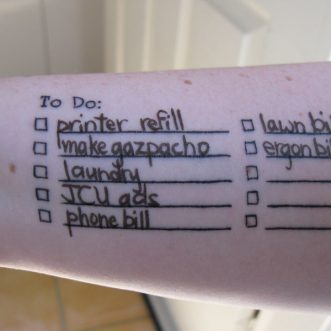November 24, 2020
I’ve been ordering a lot online lately. Not primarily because of Covid, but because we’re kitting out the extension. I’ve had no problems at all, everyone has been well set up for online sales, and everything has worked exactly as I expected.
Until this last week.
Last Monday, I ordered some coir matting. Ordering was more or less straightforward (once I’d understood the pricing), and I received confirmation by email, setting my expectation for when I might hear more about how my order was progressing. So far, so good.
A few days later, I haven’t heard anything. I call the number in the email. It rings and rings. “It’s late, maybe they’ve left for the day. I’ll try again tomorrow.” The next day I call again. It rings and rings, until finally, the call is cut off. I try again. Again, no answer. “It’s Saturday, maybe lockdown has meant they can’t be there as usual. I’ll try again on Monday.”
On Monday, I call again. Again, no answer. Twice. Three times. I send an email. No reply – not even an automated response.
Now I’m beginning to mildly panic. “What if they aren’t a real business? Should I cancel the order? How will I get my money back? Should I be ringing my credit card company?”
I look them up on Companies House and Endole. All seems OK. “But what if they’ve gone bust? Or can’t fulfill orders because of lockdown?”
I try the head office number on the website. A young lady answers. “I’ll have to give you another number, we don’t handle online sales.” It is of course, the number I’ve been calling. I explain the situation – including my fears. She laughs, “Of course we’re real! But we’re not as big a company as we look online. We’ve been really busy and it’s been a struggle to keep up. I’ll get a message over to the warehouse and get them to call you.”
Sure enough, an email arrives shortly afterwards – “Your order’s on the lorry, and should be with you tomorrow. Let us know if it hasn’t arrived by Wednesday.”
And sure enough, it arrived this morning. Phew!
There are a couple of simple things even a small business can do to prevent this kind of misunderstanding, even if you’re taken by surprise by a surge in demand:
First, immediately, have a message on the warehouse phone that lets people know they have come through to the right place.
Include in your message that if there is no answer it’s because you’re busy. Genuinely busy. Explain why. If you can’t have more than 5 people in at a time, let people know. If you’re short-staffed, let people know, and let them know what you’re doing about it. People are very understanding if you are honest with them.
Second, as soon as you possibly can, make sure the phone gets answered by a real person.
Transfer the warehouse phone to the shop, or use a pay as you go phone answering service. Even if they can’t track the order, they can at least take a message, answer frequently asked questions, and reassure your clients that the business is real, and their money is in safe hands. Messages can be dealt with asynchronously, perhaps at the end of the day when the warehouse has more time.
These two simple, cheap and relatively easy actions will also reduce the number of incoming calls (e.g. my 7 calls would go down to 1), removing the incentive for harried warehouse people to ignore the phone.
The ultimate aim is of course, to make the communication of what’s happening with my order a side-effect of the fulfillment, but don’t wait until that’s in place – if you don’t tell me, your remote client, the real story, I’ll make up my own, and it might be wild.
Online, communicating what’s happening to an order is as important is actually fulfilling it.









